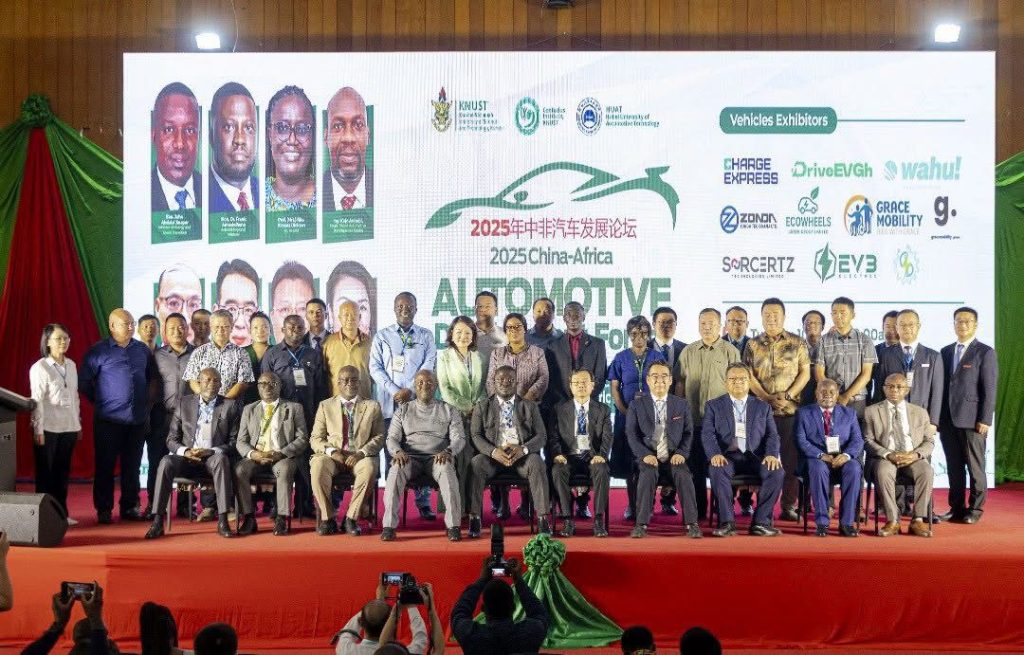The Kwame Nkrumah University of Science and Technology (KNUST) and the Hubei University of Automotive Technology (HUAT) in China are charting a means to revolutionize Africa’s automotive industry.
Under the China-Africa Automotive Development Forum, scholars and experts in the automotive sector will embrace electric and smart technologies that support inclusive and sustainable growth.
The aim is to consciously effect a paradigm shift and transition from traditional combustion technologies to smart, eco-friendly transportation.

According to the International Energy Agency, Ghana leads Africa with around 17,000 electric cars on the road.
This sets an example for Africa to revolutionize transportation through sustainable and innovative technologies that prioritize green energy.
The 2025 China-Africa Automotive Development Forum in Kumasi assembled scholars, innovators, policymakers, and entrepreneurs from across Africa and China to share knowledge and showcase technologies for sustainable adoption.

This year’s forum is themed “Intelligent Manufacturing of Lightweight Electric Vehicles”.
The Confucius Institute at Kwame Nkrumah University of Science and Technology (KNUST) serves as a key platform for collaboration with Hubei University of Automotive Technology (HUAT).
The Pro-Vice Chancellor of KNUST, Prof. David Asamoah, highlighted the institutional efforts adopted to heighten improvement in the automotive sector.

“It becomes increasingly clear that the future of mobility is electric, intelligent, and sustainable. From the development of local charging infrastructure to the assembly of electric vehicles designed for African roads, our exhibitors are showing that with the right support, Africa can lead in sustainable transport solutions.
“Together, we are initiating steps toward the establishment of the International Joint Research Centre for Advanced Automotive Energy Storage Materials and Systems, a landmark initiative that will shape the future of mobility on our continent,” he said.
The two universities will engage in extensive cooperation in automotive technology, discipline development, scientific research, and cultural exchanges.
President of Hubei University of Automotive Technology, Prof. Wang Xiao, indicated that the Conference on Lightweight Electric Vehicle Intelligent Manufacturing will deepen the cooperation.

“The two universities, linked by the Confucius Institute, have transcended geographical boundaries to walk hand in hand. Since the joint establishment of the Confucius Institute, we will pioneer a distinctive cooperation model of “Chinese language + automotive engineering. The grand occasion of the International Conference on Lightweight Electric Vehicle Intelligent Manufacturing is here at your university. This will surely inject new momentum into our cooperation,” he said.
Director for Renewable Energy and Energy Transition, Eng. Seth Mahu, representing the Minister of Energy and Green Transition, says cooperative research and exchange will support mass adoption of electric mobility in Ghana and beyond.

“Our Ministry is actively working to expand national EV charging infrastructure using solar and grid hybrid solutions; promote local content in battery assembly and recycling; offer policy incentives for EV adoption across the public and private sectors and collaborate with academia and industry to develop curricula and training programs aligned with the green economy.
“This forum, therefore, is a clear demonstration of the mutual value in China-Africa cooperation on climate-smart industrialization. And by establishing an International Joint Research Centre focused on energy storage and systems, we are creating the local R&D base needed to support mass adoption of electric mobility in Ghana and beyond,” he said.
President of the Ghana Association of Chinese Societies, Tang Hong, indicated that the automotive sector is a vital engine for economic growth.

“Ghana, as the gateway to West Africa, boasts vast market potential and supportive policies. Through this forum, we hope to deepen technical exchanges, expand collaborative opportunities, and bring more “Intelligent Chinese Manufacturing” to benefit African communities, while also allowing Africa’s unique demands to drive industrial innovation,” he said.
Ashanti Regional Minister, Dr. Frank Amoakohene, called for investment in infrastructure to make the shift and adoption seamless.

“The Ashanti Region is blessed with a rich history of innovation, enterprise, and resilience. We recognize that for electric mobility to thrive, we must invest not just in vehicles but in skills, policy frameworks, and enabling infrastructure.”
“That is why regional leadership is actively engaging stakeholders to ensure that local entrepreneurs, technicians, and graduates are ready to seize emerging opportunities in the EV value chain,” he said.
Local and international companies and experts made presentations highlighting electric vehicle innovations tailored for the African context
DISCLAIMER: The Views, Comments, Opinions, Contributions and Statements made by Readers and Contributors on this platform do not necessarily represent the views or policy of Multimedia Group Limited.
DISCLAIMER: The Views, Comments, Opinions, Contributions and Statements made by Readers and Contributors on this platform do not necessarily represent the views or policy of Multimedia Group Limited.


